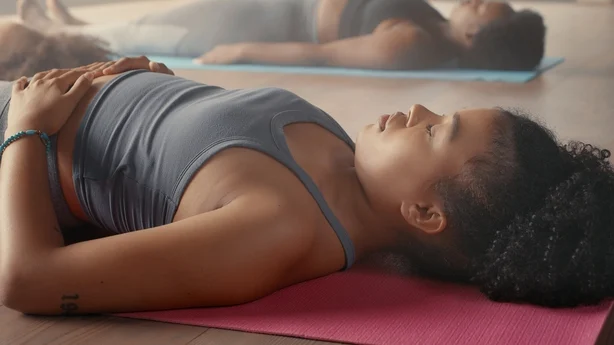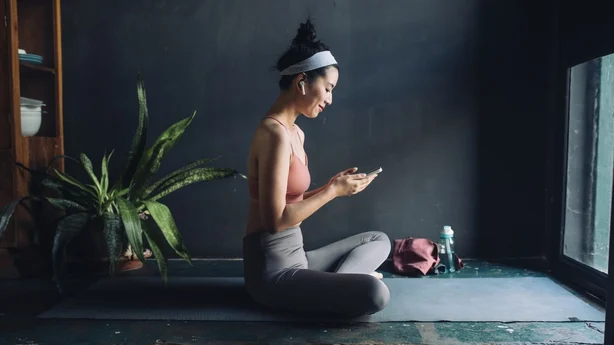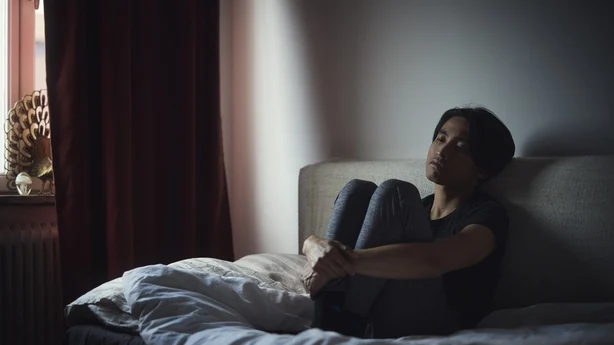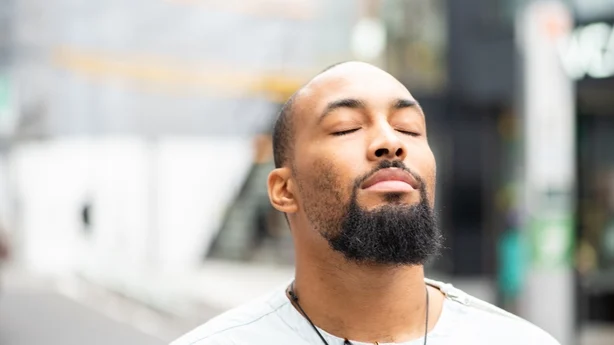Niamh Delmar is a Chartered Registered Counselling Psychologist and provides Psychological Support Workshops to work environments.
The practice of controlled breathing is free, fast and effective, but it is far more than just taking few deep breaths.
Restricting or over-breathing sends internal signals, keeping us on high alert. When we don't breathe properly, we deprive ourselves of oxygen.
There are psycho-physiological benefits of slow breathing. Measurements have shown it increases oxygenated haemoglobin in the brain and modulates the central nervous system. Nasal breathing is healthier, as the tiny hairs and mucus in our nostrils trap foreign particles, and the nasal passage humidifies the air entering.

The benefits
Research reveals that slow breathing techniques (six to nine breaths per minute) fosters relaxation, ease, comfort, positive energy and pleasantness. Anxiety, depression, PTSD and other mental health symptoms can also be alleviated by this practice. The US military uses breathing techniques during combat situations.
Slow deep breathing works as a natural sleeping aid by triggering the sleep inducing hormone melatonin. Breathwork before bed helps us declutter our minds, let go of the stresses of the day and drift into a calmer state. Shallow breathing with your mouth open decreases levels of oxygen, disrupts sleep and activates the nervous system.

You won’t sleep if adrenaline is high. Good quality sleep plays a significant role in improving mental health conditions including anxiety, depression and bipolar disorder.
Breathwork yields lower levels of cortisol - the stress hormone. Slow, nasal and deep breathing has a modulating effect on the cortex, amygdala and hippocampus in the brain. This acts as a buffer for increasing stress levels.
Breathwork activates the parasympathetic nervous system, which calms us. This reminds us that we are not in an emergency situation, and moves us from fight, flight or freeze mode to the parasympathetic mode of rest and digest.
Conscious breathing stimulates the vagus nerve which signals rest and relaxation. This cranial nerve nourishes vital organs, switches on the parasympathetic nervous system inducing calmness.

A further benefit is emotional regulation. Practicing breathwork stabilises our emotional world and enhances interactions with others.
The breath provides us with a pause so we don’t act or speak out of big emotions. It facilitates clarity and logic. Focusing on the breath helps to mute feelings such as anger or fear. Your rhythms of breathing affect your emotions.
Being reactive or on an emotional rollercoaster can be exhausting and damaging. Manipulating the breath refocuses our attention and brings the body back to rest mode. Breathing through difficult feelings increases your ability to cope with them.
With busier lives and minds, the breath provides a route connecting us to the present moment. It provides a healthy way of relating to our thoughts and not getting sucked in to them. Thoughts impact us negatively, neutrally or positively within seconds.

Using the body to calm the mind anchors us, and has a grounding effect. Bringing attention to the breath develops a distance between the thinker and the thoughts. A gap is created to pay less attention to the thoughts, or just see them as not helpful. Paying attention to the breath facilitates less attention being paid to negative or distressing thoughts.
Practicing conscious breathing also helps to cope with pain. It is used for pain control during labour, chronic pain disorders and pain sensitivity. Pain drains psychological resources, initiating or aggravating mental health conditions.
Breathwork has a painkiller effect through interoception, the brain’s perception of bodily states. It also reduces tension in the muscles alleviating the severity of pain, and lessens hyper focusing on the area of pain. Reductions in pain perception helps manage chronic pain.

Interventions
There are a multitude of breathing techniques from the simple to more complex practices. A blend of guided sessions and incorporating the breath in to your daily lifestyle is recommended. In this way, breathwork is a preventative measure and fosters a healthy baseline. It can also be utilised as an effective and immediate response to psychological disturbances such as stress or panic. Here are a few samples.
The Physiological Sigh
This is a pattern of breathing involving a double inhale of breath through the nose followed by an elongated exhale through the mouth. The first inhale is longer than the second. Studies found that a few of these bring stress levels down quickly. It re-inflates sacs in the lungs and offloads carbon dioxide.
Box breathing
This another quick and easy to use method. It resets the breathing rhythm and re-centres the individual. As you do it, you visualise a box or mentally draw a box as you breathe. Settle yourself in an upright position if possible, with your feet on the floor. Closing your eyes, breathe in through your nose counting to 4 seconds along one side of the box then hold your breath for 4 seconds along the next side, slowly exhale for 4 seconds along the next side then hold for 4 seconds along the last side of the box and repeat 4 times or longer.

Diaphragmatic breathing
This technique focuses on the muscle in your tummy. It is also referred to as belly breathing. Lying down or sitting, place one hand on your chest and the other on your tummy. Breathe in fully and deeply in to your abdomen keeping your chest still. Breathe through your nose and feel your stomach expanding. Release your breath slowly and gently noticing the abdomen contracting. Repeat several times.
Mindful breathing
This links breathing with the process of mindfulness. Bring your attention to your breath and your awareness to the present moment. Engage all your senses. Use reminders throughout the day to breathe in deeply and out fully. There are guided sessions you can use daily to build up the practice. There are various child friendly variations also.

Reviewing advocates and studies of breathwork, there are key components that have been found to be of most benefit. Slow and deep breathing settles the nervous system. Nostril breathing filters the air entering the body.
Lengthening the exhales slows the heart rate down and engaging the diaphragm increases blood oxygenation and reduces stress hormones. It needs to be integrated in to your lifestyle and practised throughout the day and preferably to use guided sessions daily also.
There is a growing interest in finding non pharmacological ways for people to experience better mental health. If symptoms are severe or there are conditions that may not be conducive to breathwork, seek professional support. While it is not a substitute for treatment, it can augment it.
If you have been affected by issues raised in this story, please visit: www.rte.ie/helplines.
Disclaimer: The copyright of this article belongs to the original author. Reposting this article is solely for the purpose of information dissemination and does not constitute any investment advice. If there is any infringement, please contact us immediately. We will make corrections or deletions as necessary. Thank you.






